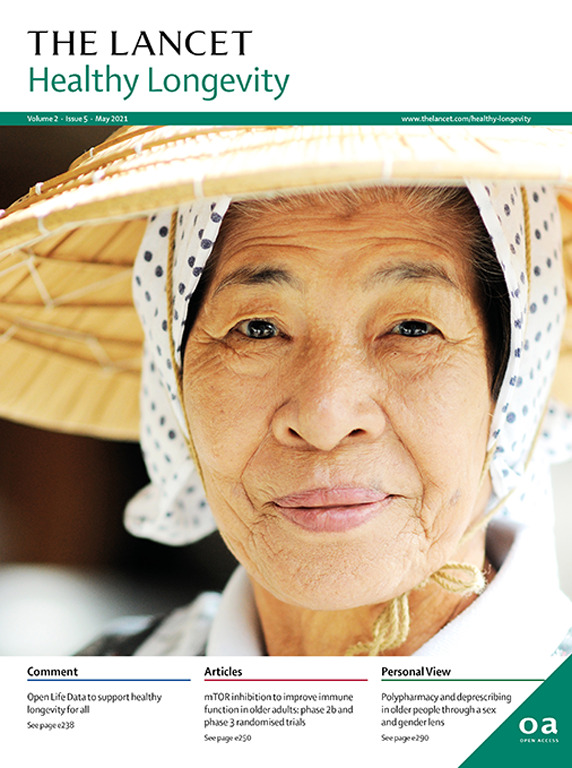老年男性自杀预防训练:澳大利亚男性工棚自杀对话课程的随机对照试验。
IF 14.6
Q1 GERIATRICS & GERONTOLOGY
引用次数: 0
摘要
背景:老年男性(≥65岁)相对于其他年龄段有较高的自杀率,在了解如何提高自杀预防知识和技能作为降低该群体自杀风险的潜在途径方面存在重大差距。本研究旨在评估自杀预防培训课程在社区老年男性样本中的有效性。方法:我们进行了一项随机对照试验,评估关于自杀的心理健康急救对话课程,该课程教导社区成员识别某人何时有自杀念头以及如何提供适当的支持。在维多利亚州(从研究开始)以及新南威尔士州、昆士兰州和西澳大利亚州(从2022年10月31日起)的澳大利亚男性棚屋(即为男性提供公共空间的社区组织,用于会面、社交、学习新技能和与其他男性一起从事有意义的项目)被随机分组(1:1)(单个棚屋或棚屋组),如果每个棚少于8人),最小化课程或候补名单控制,所有棚成员都是男性,有资格参加。主要结局是参与者对自杀者的预期行动(推荐或不推荐),在基线、1个月随访和7个月随访(主要时间点)测量,并通过治疗意向进行分析。本试验已在ANZCTR注册,ACTRN12621000756820。研究结果:在2021年7月14日至2023年9月27日期间,10个组被分配到干预组,10个组被分配到对照组,其中19个组被分析为一个干预组在基线前退出。排除未提供数据或撤回同意的参与者后,共纳入261名参与者:干预组92名,对照组169名。参与者的平均年龄为71.6岁(标准差为8.8)。对于支持自杀者的预期行动的主要结果,干预组在1个月的随访中比对照组在推荐的行动方面显示出更大的改善(平均差4.42,95% CI 3.19至5.64)。解释:在男性棚里提供关于自杀的对话课程可以提高社区中老年男性的自杀预防技能。资助:澳大利亚医学研究未来基金。本文章由计算机程序翻译,如有差异,请以英文原文为准。
Suicide prevention training in older men: a cluster randomised controlled trial of the Conversations about Suicide course in Australian Men’s Sheds
Background
Older men (aged ≥65 years) have high suicide rates relative to other ages and there are major gaps in understanding how to improve suicide prevention knowledge and skills as a potential pathway to reduce suicide risk in this group. This study aimed to evaluate the effectiveness of a suicide prevention training course in a community sample of older men.
Methods
We conducted a cluster randomised controlled trial evaluating the Mental Health First Aid Conversations about Suicide course, which teaches community members to recognise when someone is experiencing suicidal thoughts and how to provide appropriate support. Australian Men’s Sheds(ie, community organisations that provide communal spaces for men to meet, socialise, learn new skills, and work on meaningful projects with other men) in the state of Victoria (from study onset) and additionally in New South Wales, Queensland, and Western Australia (from Oct 31 2022) were randomised (1:1) in clusters (single sheds or groups of sheds, if fewer than eight men per shed)with minimisation to the course or a waitlist control and all shed members who were men were eligible to participate. The primary outcome was participant intended actions (recommended or not recommended) towards a suicidal person, measured at baseline, 1-month follow-up and 7-month follow-up (primary timepoint), analysed by intention to treat. This trial is registered with ANZCTR, ACTRN12621000756820.
Findings
Between July 14, 2021 and Sept 27, 2023, ten clusters were allocated to the intervention and ten to the control, with 19 clusters analysed as one intervention cluster withdrew before baseline. Following exclusion of participants who did not provide data or withdrew consent, 261 participants were included: 92 in the intervention group and 169 in the control group. The mean age of participants was 71·6 years (SD 8·8). For the primary outcome of intended actions to support a suicidal person, the intervention group showed a larger improvement than the control group on recommended actions at 1-month follow-up (mean difference 4·42, 95% CI 3·19 to 5·64, p<0·0001) and 7-month follow-up (3·31, 2·06–4·57, p<0·0001). For non-recommended actions, the intervention group showed small, non-significant reductions at both timepoints relative to the control group (1-month follow-up: –0·48, –1·20 to 0·24, p<0·19; 7-month follow-up: –0·58, –1·32 to 0·16, p<0·12).
Interpretation
Delivering the Conversations about Suicide course in Men’s Sheds could improve the suicide prevention skills of older men in the community.
Funding
Australian Medical Research Future Fund.
求助全文
通过发布文献求助,成功后即可免费获取论文全文。
去求助
来源期刊

Lancet Healthy Longevity
GERIATRICS & GERONTOLOGY-
CiteScore
16.30
自引率
2.30%
发文量
192
审稿时长
12 weeks
期刊介绍:
The Lancet Healthy Longevity, a gold open-access journal, focuses on clinically-relevant longevity and healthy aging research. It covers early-stage clinical research on aging mechanisms, epidemiological studies, and societal research on changing populations. The journal includes clinical trials across disciplines, particularly in gerontology and age-specific clinical guidelines. In line with the Lancet family tradition, it advocates for the rights of all to healthy lives, emphasizing original research likely to impact clinical practice or thinking. Clinical and policy reviews also contribute to shaping the discourse in this rapidly growing discipline.
 求助内容:
求助内容: 应助结果提醒方式:
应助结果提醒方式:


